#chinese incursions
Explore tagged Tumblr posts
Text
Deterrence Through Superior Numbers: Is There Anyone There?
by Cliff Potts, Editor-in-Chief, WPS.News Exposé: Tensions in the West Philippine Sea The West Philippine Sea is a vital waterway for the Philippines. It is full of resources and is crucial for fishing communities. However, tensions have been rising in this region, primarily due to aggressive actions by Chinese vessels. Recent reports highlight various incidents that have raised alarms. In a…
#angling power boats#china#Chinese incursions#environmental concerns#Exclusive Economic Zone#fishing boat incidents#Geopolitical tensions#international waters#Just and Unjust Wars#maritime rights#Maritime Security#Michael Walzer#military deterrence#naval confrontations#Philippine Coast Guard#Philippine fishermen#regional stability#Stealth Runner Project#territorial disputes#West Philippine Sea
0 notes
Text

// GUARDIAN //
#me? posting sunrise verse art? it's more likely than you think!#sunrise verse#also pspspspsps new artist signature i've decided to use my chinese surname to sign things#faster and prettier than what i've been doing (artfight user)#anywayyyyyyyyyy this is from like.......~107 AZ probably?#a couple years after the break in the treaty and the start of the incursion properly#but when xiaoge is still in his twenties (he's born in 85 AZ so he'd be about twentytwo)#the ranger system is in its infancy and no one really..................knows anything (about the ranger upgrades they're doing or how to#best fight the hive)#zhang ruitong is recently dead and xiaoge is zql but because he's an active ranger the zhang are more controlled by the board#than by xiaoge himself#(and yes before you ask—that board IS the origin of each sect hosting a ranger having a board#originally the only sect who hosted rangers was the zhang but when rangers became more common#they needed to expand their net of control. so the modern (thyme and rosemary era) boards were implemented#and they'll exist until around bronze gate construction era)#c.art#c.txt
12 notes
·
View notes
Text
The Senate on Tuesday unanimously adopted a resolution condemning China's incursions in the West Philippine Sea and its continued harassment of Filipino fishermen.
The measure also exhorted the Philippine government to take action in asserting its sovereign rights over the country’s exclusive economic zone (EEZ).
The resolution also calls on China to stop its “illegal activities” in accordance with the United Nations Convention on the Law of the Sea (UNCLOS) and with the 2016 ruling of the Permanent Court of Arbitration (PCA).
The adopted Senate Resolution 718 was the outcome of an all-member caucus on Monday where the senators discussed with Foreign Affairs Secretary Enrique Manalo and AFP chief Romeo Brawner Jr. the appropriate action on Senator Risa Hontiveros’ resolution which urges the Department of Foreign Affairs to bring China’s aggression before the United Nations General Assembly (UNGA).
In his manifestation after the adoption, Zubiri explained that Hontiveros’ resolution was not “watered down” but rather strengthened after the meeting with the country’s Foreign Affairs chief and the top military official.
“We came out with a strong consensus yesterday after the discussions with the West Philippine Sea Task Force, together with the AFP chief-of-staff General Brawner and DFA Secretary Manalo and actually we never watered down the resolution that we filed, we actually strengthened the first resolution that we initially filed with Sen. Risa,” Zubiri said.
“I think what happened here is we strengthened the position of the government. Now, we gave them several options to choose on how to deal with our neighbors in the north,” he added.
Among the courses of action enumerated in the adopted resolution are:
-Bringing international attention to China’s harassment of Filipino fishermen in the Philippine EEZ and its continued violation of the Hague Ruling and the UNCLOS
-Utilizing international fora to rally multilateral support for the enforcement of the Hague Ruling and raise awareness on the real situation in the WPS
-Engaging like-minded countries in various international organizations, meetings, and other fora to call on China to respect the Hague Ruling and the UNCLOS and subject to necessity and prudence
-Filing a resolution before the UNGA to call for the cessation of all activities that harass the Philippine vessels and violate the Philippines’ established rights in the WPS
-Pursuing such other diplomatic modes as the DFA may deem appropriate and necessary
3 notes
·
View notes
Text
Cooking for New Year
Here's a one-shot fanfic I wrote for Lunar New Year as it winds to a close! Had to live up to the blog title, haha. Features Mentor!Snape and Cho Chang (platonically, as per usual for this blog). Also features my attempt to explain how Cho Chang started being called Cho on Hogwarts campus, despite it being more commonly a last name. Feel free to leave feedback, in a kind way — this is my first time publishing fanfic...
~~
Cho wasn’t her first name, to begin with. Of course it wasn’t. But it was still hers and had always been, since before she was born, since her mother, Cho Subin, had left her Pureblood Wizarding family in Korea, married Edgar Chang of the British Isles, and informed him that their children would take her family name as well as his. Edgar hadn’t taken much persuading. His parents, who had worked hard to retain at least some of their identity as a Chinese Wizarding family in Britain, were at first inclined to view this change of name as an incursion, but Edgar felt that history would see he was ahead of his time. He had his way in the end.
When their daughter was born, Edgar and Subin filled out the birth certificate with a space between “Cho” and “Chang.” A space, not a hyphen; a space to give enough room to be completely Korean and completely Chinese.
The quill that addresses Hogwarts letters and minds Hogwarts enrollment does not often err, but it had trouble with spaces. At eleven years old, “C. Cho” found to her surprise that half her name had been forgotten. She explained by owl post that her family name was “Cho Chang,” not “Cho.” The letter back was addressed to “Miss Cho Chang.” Surely all was well.
But all was unfortunately not well, as she discovered when her full name was called as “Chang, Cho!” during the Sorting Hat ceremony. A Slytherin or a Gryffindor would have refused to respond to the wrong name. A Hufflepuff would have gone with it to make sure no one felt upset. This girl, in a sort of appalled hilarity, wanted to see how far the situation would go for reasons of social science — surely someone would realize “Cho” was actually a family name? The Hat instantly put her in Ravenclaw.
~
Cho hadn’t felt strongly about her real given name, but she was actually beginning to like the current state of things. People throughout her life had continually forgotten about the Korean part of her surname, as though she weren’t the daughter of the first witch to span Eurasia in solo broom flight. With “Cho” working as a given name, people at Hogwarts didn’t overlook it the same way. Besides, Cho Chang — tomboy and girly girl, emotionally driven Ravenclaw — liked being unexpected and having secrets.
Cho passed unremarked through class after class until roll call in Potions. Professor Snape read her name aloud, paused, and gave her a keen and searching glance. But he went on marking names. Perhaps it had been a fluke.
In general, Cho wasn’t very good at school. Several of the other Ravenclaws had begun wondering why she was in their House, not in a mean way but in a speculative way, because Cho got names and dates and words and numbers all mixed up when you had to say them just right, especially under the pressure of a class. But though her verbal knowledge faltered, her hands were always sure. Cho had a physical memory like no other. Every broomstick maneuver, every swish of the wand in Charms, every Potions recipe — if she did it in the real world once, she’d remember it forever. In Potions class, all the numbers and words went with physical objects she could feel in her hands, but History of Magic was hopeless, and she knew she’d never take Arithmancy. Charms still had the word problem; why did it have to be “Wingardium Leviosa,” anyway? The whole thing felt arbitrary.
Aside from flight lessons, Potions was fast becoming her refuge. When she was cutting up roots or stirring her cauldron, she felt like she was home with her father, working in his kitchen. Her mother wasn’t much for cooking, but her father loved it. In the kitchen, he’d throw his natural caution and Slytherin-trained polish aside and start making things, a manic gleam in his eye. He’d taught himself to make not only the Chang family’s traditional magic-infused food, but all the dishes his wife missed from Korea, unfamiliar magical components and all. Cho often missed his Transforming Tteokbokki in Transfiguration class. She’d been allowed to help with the nonmagical elements, but her father was scrupulous about underage magic.
The skills Cho had learned, though, and all the watching she had done, meant that even Professor Snape’s eyebrows rose slightly at her potion-making aptitude. Snape was silent in approval, but so had Cho’s father been, so it didn’t bother Cho. Sometimes Snape sent a particularly hapless Hufflepuff or Ravenclaw to “work with Miss Cho Chang” in an effort to prevent catastrophe.
Cho’s classmates noticed that Snape always used, as they thought, Cho’s full name, and that he said almost nothing to her at all. “He must really hate you,” they whispered. Cho snorted inwardly.
Marietta Edgecombe was the only one who figured it out. “What’s your actual first name?” she asked. “I know it’s not Cho. Snape’s too — correct — to be using your full name all the time.”
Cho told her. “Promise you won’t tell,” she added. “I want to see how many other people figure that out. So far, it’s only you and Professor Snape.”
Marietta promised, and she never did.
After Potions one day, where she’d stayed (as usual) to help tidy up and spend just a little longer in a place that felt more like home, Cho asked, “Professor? How did you know my first name’s not Cho?”
Snape said only, “I knew your father at school.” But two pairs of dark eyes narrowed in shared amusement at the picture of Edgar Chang ever giving his daughter “Cho” as a first name.
~
The weeks went on. At age eleven, Cho was not yet considered pretty. Rather the reverse. One day Snape heard someone loudly talking in the hall about how "awful" someone looked, with their "greasy black hair" and their "unsettling black eyes" and their "weird skin tone." They had left out his nose this time, he noticed. He was used to this sort of thing, and it didn’t bother him, but he started making his way quietly to the door, hoping to sneak up on the offender and watch them jump. It was one of the few perks of being a teacher.
A second voice was hotly retorting, “If you’re not careful, you’ll find out what ‘black eyes’ really mean!” Well, that was unusual. Snape opened the door. One child, the first speaker, whirled in fear and fled as Snape called out a ten-point deduction over her head. The other child, Miss Cho Chang, was looking at him with — was that gratitude?
Snape was not used to extending sympathy. What he said was, “Not British enough for them, are you,” with a little sneer. But the sneer was directed down the corridor at the retreating offender, and when Miss Cho Chang said, “No, sir,” with a rueful smile, it didn’t take Legilimency to infer her thoughts: You and me both, sir. For some reason, Snape wasn’t offended. He supposed he must be going soft.
~
Lunar New Year came around, but the Great Hall stayed gloomily normal in decor, and everyone was wearing black. It all felt wrong. Cho had dreamed about her father’s New Year life-fortifying yi mein and magic-renewing tteokguk until she thought she’d go insane. Her parents had sent her the recipes by owl, but Cho had nowhere to prepare them. By following Fred and George Weasley, she’d found the Hogwarts kitchens, but the house-elves wouldn’t let her cook, and they seemed unable to make anything but depressingly nonmagical British food. They did give her ingredients, but the magical ones were missing, and so was a workspace. It was a true marker of her desperation that she decided to ask Snape to use the Potions lab.
Cho had never expected him to say yes. She certainly hadn’t expected him to contribute ingredients or supervision. She didn’t know she wasn’t the first Chang to make Severus Snape a dish of magical yi mein, an experience which would make anyone want to try the newer family recipes. Nor did she know that Edgar Chang’s knack for combining the magical and the tasty was envied by potion-makers across the British Isles. All she knew was that she had shown Snape the recipes to show she wasn’t doing anything crazy, and his eyes had flicked over them and come up to rest thoughtfully on her face, and he had said, “Six o’clock Tuesday evening, Potions classroom. You may use my essence of immortality peach and heavenly bamboo extract.” As she thanked him and left, he added, “In future, Miss Cho Chang, bear in mind that most potion-makers do not show others their family recipes.”
So Tuesday night found Cho humming softly to herself, combining ingredients with a practiced deftness beyond her eleven years, only needing to consult the recipes to see what to do with the magical ingredients Snape had provided. Snape himself was marking essays in the corner. He mostly ignored Cho, only making his presence known by an occasional sniffing noise.
Marietta was looking for Cho, who hadn’t been seen at the Great Hall for dinner that day. At last, she tiptoed into the Potions dungeon to a very unusual scene. Snape and Cho were slurping noodles from two bowls, not talking or looking at each other, but with intense focus on eating the food. Other bowls beside them held soup. It was very strange to see, almost as strange as the fact that the dungeon was full of an incredibly delicious smell, instead of its usual foul fumes.
Marietta backed away slowly, but Cho saw her and waved her forward. Marietta looked at Snape. Snape, without looking up from the noodles, conjured a third set of bowls; was that a smirk at one corner of his mouth? It was hard to tell with all the noodles.
~
A few mornings later at mail time, the whole Great Hall was surprised to see Snape receiving a red-and-gold package. Even more shockingly, he seemed to be trying not to smile. “What’s going on?” asked Angelina Johnson, at the Gryffindor table. “Those are Gryffindor colors — he hates everything Gryffindor!”
“It must be a prank,” said Fred at once. “I wish I’d thought of it. Did you —”
But George was shaking his head. “He’s not looking at us at all,” he said in disappointment. “It almost looks like — but it can’t be — what would that have to do with Ravenclaw?”
Over at the Ravenclaw table, the girl known as Cho Chang grinned.
16 notes
·
View notes
Note
re: China/Taiwan
All of the examples of Chinese action you mentioned from the last 12 years were, as you pointed out with Joint Sword, in response to something from Taiwan or America (and I’ll own that I should have made Taiwanese agency here clearer - you’re correct that it isn’t solely America leading). Regardless of rhetoric from China it seems like the pace of change isn’t being set by China.
ADIZ incursions are nearly impossible to avoid given the overlapping areas - the Taiwanese ADIZ extends over the mainland, and Taiwan somewhat arbitrarily counts activities in the southwest zone outside or what most people would consider Taiwan as median line crossings. The pace has escalated over the last few years but as you pointed out it follows American and Taiwanese action like Pelosi’s visit.
With natalism, I’m again not clear what ‘investigation’ or ‘survey’ you’re referring to (and those terms aren’t interchangeable). There was a recent policy announced to lower the cost of raising children, but there’s also been a lot more work over the last two years to, for example, introduce vouchers for consumer goods upgrades/trade-ins. I’m not sure why you’re evaluating natalism as a top priority for the Chinese government when the Chinese government’s rhetoric and actual policy work seems to downplay it and treat it as an extension of cost of living challenges?
I’m not sure what other foreign policy has to do with anything - water rights negotiations, internal policing in Hong Kong, and the yes aggressive actions in relations to maritime border disputes in the SCS are very different from the sui generis relationship with Taiwan. That would be like saying we should treat America’s relation with Cuba as grounds for assessing Trump’s policy on Canada after his recent 51st state joke, which we hopefully agree would be deeply misguided.
I never said anti corruption was Xi’s primary focus, I said it was his top priority which legislatively it is. He’s promoted the previous head of party discipline, reiterated anti corruption rhetoric far more often than anything to do with Taiwan, and strengthened internal monitoring. He may well be doing it to strengthen his position, I won’t argue otherwise, but it’s definitely a much higher priority than anything Taiwan related.
You’re conflating cross strait relations with reunification rhetoric. Yes there have been swings in the relationship especially in 1996, but Beijing’s position has been consistent. Reunification is inevitable, peaceful reunification is preferred, force remains on the table. Xi hasn’t changed any of that. What has changed is that since the sunflower movement pro-mainland factions in Taiwan have been weakened and the hard greens have been emboldened, and more importantly Trump moved the Overton window to back Taiwan and challenge China more aggressively. In that framework China is the reactive party and unlikely to initiate an invasion in the near future - there’s nothing to suggest Taiwan has moved up the priority lists only that action/reaction framework is more active
Alright, wow, there's a lot to unpack there.
The idea that "pro-mainland factions have been weakened," as if by outside action, doesn't pass merit. Taiwan's democratic push came with a push against reunification because, having experienced decades of the Chiang dictatorship that repressed Taiwanese culture and having achieved a representative democracy, they were not eager to place themselves back under the boots of another dictator who would stamp out the island's heritage. This is a failure of China - they have made reunification unappealing. I'd argue that reunification rhetoric has changed from the Chinese side because it represents a much more drastic shift in the lives of the Taiwanese compared to decades prior. Moreover, I'd argue that Beijing has changed their position - they demanded that Tsai Ing-wen recognize the PRC's interpretation of the 1992 Consensus as opposed to the deliberate ambiguity of previous eras.
The idea that China has been a reactive player is again, completely wrong. Military drills are not cheap, and are not used as mere signaling devices. The first circumnavigation with fighter aircraft came after a statement saying "Our pledges have not changed and our goodwill has not changed." Somehow, though, that's aggression.
The Taiwanese rejection of the "one country, two systems" model is completely China's fault - they had espoused one country, two systems for Hong Kong only to completely brutalize the city. Much as we saw in Ukraine - the failure of the Budapest Memorandum to deter Russian violation of the Ukrainian border in the seizure of Crimea meant that Ukraine sought NATO membership as a deterrent. Taiwanese rejection of the one country, two systems model is because Beijing deliberately violated it.
Natalism, the about-to-go-into-effect pension reform, the relaxing of the previous one-child policy to a two and later three-child policy suggests that the demographic issues are actually of concern to Chinese lawmakers.
You've failed to make your point on the ADIZ. I was using the USAF figures and again, as I've noted, the ADIZ violations have continued for years after the Pelosi visit. This suggests to me that the idea that they were due to Pelosi is false - she's long left the island and the ADIZ violations continue at a high pace. It's used as a continual excuse, thus it holds no meaning. Sorry, but you have failed to create a logical argument for that to be the case as opposed to what it is, a deliberate attempt to intimidate Taiwan into pro-mainland policies as opposed to a reaction.
Your use of the reducto ad absurdum straw man fallacy has been noted and cheerfully ignored. Pattern shifts are a real thing in geopolitics. I'd recommend against using logical fallacies to prove your point - they're quite ineffective.
Characterizing China's foreign policy actions as "water rights negotiations, internal policing in Hong Kong, and the yes aggressive actions in relations to maritime border disputes in the SCS" is not only dishonest, it's outright disgusting and laughably debunkable. The SCS is not a maritime dispute - it's an illegal claim contrary to all international law (UNCLOS), laws which China had signed. The Mekong River issue is not a water rights negotiation, it was an attempt to create an artificial drought downstream and force concessions on independent countries and prevent them from conducting their own independent foreign policy, again in contravention to international institutions already addressing the issue - the Mekong River Commission. Hong Kong was not an internal policing matter, it was a violent crackdown characterized by arbitrary arrests, police brutality, and confessions extracted via torture. To frame them as such is to minimize very real violations of international law and human rights.
I get it, you're trying to push PRC talking points. I'd suggest pushing them elsewhere.
-SLAL
13 notes
·
View notes
Note
Hey I'm doing some fanlore edits (https://fanlore.org/wiki/Daomu_Biji) and do you have any sources for popular ships in Chinese fandom? I basically just cut it down to pingxie and heihua because those were the ones showing up in 2021 lofter data (https://hardwareabstractionlayer.tumblr.com/post/649989752761810944/the-top-100-ships-in-chinese-fandom-according-to) and like basically ONLY pingxie is on ao3 in any numbers but I'm pretty sure HuaXie was a whole big thing I just can't find a source for it... Thanks in advance!
hi! i don't know if i'm necessarily the best person to answer this question because my incursions into the chinese DMBJ fandom are very curated and basically mostly limited to pingxie spaces, so my knowledge of other ships and their hubs is pretty sparse
that being said, finding centralized hubs to get full numbers and stats from for dmbj ships historically in the chinese fandom is complicated for a number of reasons, one of them being that DMBJ is an older fandom, which means a number of fics were hosted on websites and forums that no longer exist. another is that due to the state of chinese internet, fans also host fics and fan art of ships in closed access forums that are sometimes more or less difficult to gain entry to so as to create safe spaces. that being said, there are still ways to somewhat measure the current popularity of a ship. since this is an ask, i figured i'd turn this into a small informative post if anyone is interested in a surface level overview of what's popular in the chinese fandom by comparison to the english-speaking one. just keep in mind that because of all the above reasons, this is only ever going to be an overview of what's currently popular in general and not everything that exists, because arguably probably everything exists in some capacity, and of course this is all very surface level, so i'm sure someone else could do a more in-depth deep dive, especially if they get around more
disclaimer: because i know some might take this the wrong way, to be clear this is NOT meant to spark any kind of discourse surrounding ships, nor is it here to say that some ships are "better" than others. it's purely numbers i've tried to present as objectively as possible, mostly to provide comparison between two different sides of the fandom that behave differently and have sometimes vastly differing preferences
Chinese DMBJ Fandom Ship Popularity
to start off, i think it's relevant to point out that ao3 isn't the best way to measure a ship's popularity in chinese fandoms even if it can give you a rough idea. it can get you rankings to some extent (and even then it really depends), but the numbers aren't going to be at all accurate considering ao3 isn't the platform of choice for chinese fan fiction for several reasons i won't get into here, but that i'm sure people who've been in cdrama/novel fandoms are probably aware of
so your best bet to get any sort of idea of what ships are most popular is by looking at how they rank on big public platforms, namely lofter and weibo
lofter has yearly rankings like the one OP mentioned that people talk about, and it's a fairly good way to get an idea since it's a pretty popular blogging website for fan fics and fan art. lofter isn't cooperating with me right now, but i'll be using the data compiled for end of 2023 (or as of february 2024) by this bilibili video for the 200 most popular ships on lofter. among those 200 most popular ships, 3 of them are DMBJ ships, and are ranked as follows:
XiePing (not to be confused with PingXie, because yes, chinese fandom differentiates ships by top/bottom dynamic) at #120
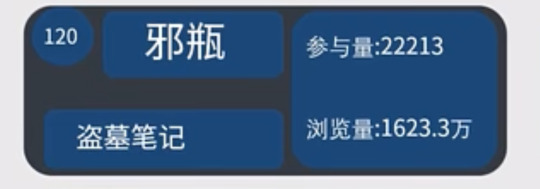
HeiHua at #25
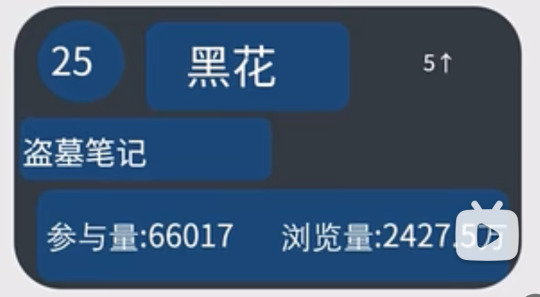
PingXie at #2

no other DMBJ ships make an appearance on this list, and if nothing else, it tells you not only that both PingXie and HeiHua are by far the most popular DMBJ ships in general, but also gives you an idea of just how insanely popular DMBJ is in china overall to have three ships in the top of a general fandoms ranking
next we have weibo where getting an idea of a ship's popularity is a bit different, and there are multiple ways to do it, but one of the easiest ones to get an idea is by looking at how high a ship's super topic ranks on both the real time and weekly popularity rankings. super topics function similarly to how communities work on X and aren't tags, so not everything tagged with a ship is necessarily going to reflect what's posted in the super topic and vice-versa, but it still gives something of an idea of overall popularity. looking at the today's super topic ranking in the fictional characters category, again the same two ships show up in the rankings:
HeiHua at #23

PingXie at #5
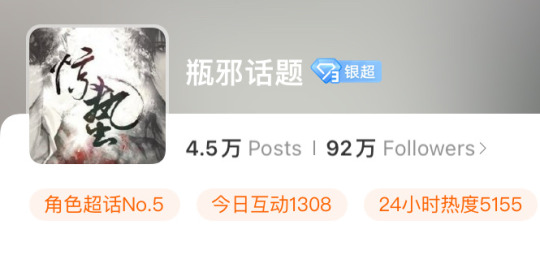
for the sake of comparison, because it's easier to actually see figures with weibo super topics, i also looked up both other ships that do get some traction in the chinese fandom despite being less popular, as well as ships that the english-speaking fandom tends to talk more actively about (in tumblr spaces anyway)
HuaXie at #174, which has an audience, but the numbers are already very different and speak to the fact it's generally speaking a smaller ship as of now (for reference, 万 that you see on these pictures is a unit for ten thousand, so here 1.1 万= 11,000)

HeiPing (unranked), which is in somewhat of a similar situation as HuaXie, but considering HuaXie is ranked, it's safe to say that's probably the only other ship that's even remotely popular by comparison to the two giants that are PingXie and HeiHua

allXie at #160, which is less a ship and more of a bottom!wu xie enjoyers cocktail that has a little bit of everything under the sun, though is mostly a mix of wu xie being shipped with some of the main male characters (i.e. xiaoge, hei xiazi, xiao hua) as well as other more minor characters such as zhang haike notably. it's not really a thing in the english-speaking fandom, but it's worth mentioning because it does exist enough to be represented

PangXie (unranked), which is quite honestly one of the bigger contrasts between the chinese fandom and the english-speaking one in that this ship is pretty much non-existant, or at least i've never seen fan fiction for it. again, my view of things is biased because my experience is deliberately curated so it's entirely possible there are things i just don't see, but the numbers don't seem to contradict that impression

PangYun (unranked), which i'm providing here mostly because pangzi is most often shipped with yuncai (and usually as a sideship that i can tell), though these numbers aren't necessarily representative of what content exists for this ship, since most things tagged as PangYun are posted to the general DMBJ super topic. if anything this mostly gives the impression the ship doesn't have much of a dedicated following, especially given it's part of the other category rather than the fictional characters category

PingSang (unranked), which is one of the only two ships that have any kind of following that involve liu sang, is also in the other category, and along with PangXie and his other most notable ship, is most definitely a rarepair, which is another notable difference with part of the english-speaking fandom where liu sang ships tend to be both fairly popular and have active communities

CanSang (unranked), which is in yet another category (CP as in couple as in ship), though this one's rarepair status might be explained by the fact that, if you couldn't already tell, the chinese fandom has little to zero interest in secondary or minor characters, and beyond that, the core of the chinese DMBJ fandom doesn't care much for the dramas/live action adaptations and is largely centered around the books, so given the premise of this ship is based in the adaptations, it's not surprising

Iron Triangle at #65 is getting a special mention, not only because it is ranked, but also because it's not necessarily what you think. the 角色 or fictional characters category for super topics isn't limited to ships, so you also have super topics for characters on their own in it. what chinese fandom considers to be the six main DMBJ characters, aka wu xie, xiaoge, pangzi, xiao hua, hei xiazi, and huo xiuxiu, each have their own super topics that are in the top 200. the iron triangle topic is ranked, but it's more in the same vein as those, that is to say it's a gen super topic, not a ship super topic. the chinese fandom doesn't seem to be into polyships in general, so that might explain it

i'm not sure how informative this post is, since i get the feeling some of this information is either obvious or things that people already know more or less, and i'm also not sure it really answers OP's question about finding reliable sources for numbers, but it's a surface level attempt. if anyone has more in-dept knowledge or would like to add onto this with different sources or data feel free to!
#dmbj#daomu biji#盗墓笔记#ships#fandom culture#i'm not really sure how to even tag this#ship popularity stats#?
23 notes
·
View notes
Text
※ 「中国軍機の領空侵犯を確認」今回が初めての侵入! 侵犯機が通った航路は?
https://trafficnews.jp/post/134575
*Chinese Electronic Intelligence Plane Makes Unprecedented Incursion Into Japanese Airspace
(中国の電子偵察機が前例のない日本領空侵犯)
https://www.twz.com/air/chinese-electronic-intelligence-plane-makes-unprecedented-incursion-into-japanese-airspace
注目すべきは、航路ですね。飛行コース。新田原からだと、230キロ、築城からだと、280キロ前後。要撃任務としては、アベレージな距離です。何度も言いますが、那覇-尖閣諸島は450キロorz。
それで、いかにも、針路変更するタイミングを逸して、偶然入り込んだようにも見えるけれど、その前後の航路は、当初フライトプラン通りと見て良い。
任務の目的は明らかに、スクランブルのレスポンス・タイムを計り、こちらの稼働状況を探ることです。それなりの時間、空域に留まってトラフィック・パターンを描いているので、こちらも、複数の編隊を上げたはずです。何機上げられる状況にあるのか探りたかった。冷戦時代なら、最低でも10機は上がっているパターンですが、果たして今回、空自は何編隊繰り出したのか?
これが、故意か偶然かの決定的な結論は出せない。そういう場合は、こちらは、故意であったと判断するしかない。その故意の意図は何か? 恐らく、先日、尖閣で海保が主権を行使したことへの報復でしょう。
8 notes
·
View notes
Text
Gulf of Mexico to be renamed because…
In the interest of pointing out misinformation:
In Dec 2023, there was a decision by the World Court, that gave water above land shelves to those countries and ruled they were not international water.
The renaming of the Gulf of America isn't renaming the whole gulf.
It is renaming the area above our land shelves as our territory.
You can't exactly put signs or border walls in the middle of the ocean.
So for legal reasons, we need to identify these new changes on the map, so that new borders are made clear to maritime traffic.
Those new maps will set the latitude and longitudes of where our border begins, or the Gulf of America.
So all maritime traffic knows when they are leaving international waters.
This is where knowing what is happening in the world, will help you filter out drama, and help you understand the legalities in your own country.
This had nothing to do with Trump's ego, he is strengthening our borders and making sure all maritime traffic understands the changes that happened in 2023.
Putting legal protections in place to help us enforce any military actions or incursion in the future.
Betting most of you never realized the US grew by thousands of miles.
Likewise some of this radical idea of buying Greenland and possibly Canada. has nothing to do with his ego.
That has to do with the race for minerals in the Arctic Ocean, protecting our borders, and getting us the legal right to help Europe protect their borders from the Russian and Chinese fleets that have been doing damage to infrastructure.
If Greenland is the territory of the US, but still their own country like Puerto Rico, then we have the legal right to have a base there and the legal right to protect the waters around Greenland.
The whole premise right now, if we were to go help Europe it would trigger an act of war.
We would have to wait for NATO action to do anything.
If we have the legal right, to be there – the legal right to protect Greenland – then any response to defend our territory is not considered an act of war.
Itmakes it easier to help our Allies.
Also, like as not, Russia and China have been making plans to invade Greenland.
do you I have been hearing they are trying to buy up land around harbors in several countries or eyeing what they can take by force.
So Trump is not crazy.
Not being an egotistical dictator.
He is trying to strengthen the U.S. and working to provide some checks and balances that strengthen our ability to help Allies and prevent another world war. A lot of countries are getting we are the lesser of the two evils – media not so much, they have grown allergic to fact-checking, and understanding any complex issue and just become about stirring drama rather than reporting facts, all of the facts.
3 notes
·
View notes
Text
China fired back at the Trump administration’s tariff hike, raising duties on U.S. goods to 84 percent—a dramatic increase from the previous 34 percent. The move came just hours after the U.S. imposed its own sweeping increases, bringing total tariffs on Chinese imports to over 100 percent, and was followed with a declaration by U.S. President Donald Trump of 125 percent tariffs today. For Beijing, the political message is unambiguous: The United States is weaponizing trade beyond the realm of economic rationality.
China’s knee-jerk response has been to meet Trump’s threats with resounding resolve and retaliatory tariffs: Official statements and state media editorials insist that the country possesses “sufficient tools” and “full confidence” to respond. But that instinct—while emotionally satisfying—is a strategic misstep.
Tit-for-tat tariffs may appease nationalist sentiment, but they lock China into a spiral where the structural asymmetry of trade plays to Washington’s advantage. With a persistent bilateral surplus, China eventually runs out of American goods to penalize. Beijing has tried to broaden its toolkit—imposing export controls on rare earths, ramping up scrutiny of U.S. companies, and delaying customs clearances—but such tools come with collateral damage. They spook investors, rattle supply chains, and alienate potential allies.
The deeper risk is that non-tariff retaliation—especially possible moves targeting American firms operating in China or blocking agricultural imports—will further dent foreign investor confidence. At a moment when Beijing is trying to court capital and stabilize markets, these tactics are self-defeating.
If China wants to disarm the trade-war narrative, it needs to do something far bolder: flip the script.
First, Beijing must accelerate trade and investment deals with key neighbors and partners—not just in rhetoric, but with visible, sustained follow-through. This means breaking the logjam on the long-stalled China-Japan-South Korea Free Trade Agreement, strengthening implementation of the Regional Comprehensive Economic Partnership (RCEP), and reenergizing dialogue with the European Union.
While some of these efforts have surfaced in recent weeks, they remain only a starting point. While European concerns over industrial overcapacity, state support, and China’s alignment with Russia persist, this moment offers a rare opening to reset. Beijing might also consider revisiting discussions around joining the Comprehensive and Progressive Agreement for Trans-Pacific Partnership (CPTPP)—a signal of serious intent to reintegrate into global trade frameworks and reassure skeptical partners. Europe is increasingly anxious that the latest U.S. tariff assaults will deflect Chinese exports toward their markets. The concern is real: If the U.S. closes its doors, Chinese goods may flood elsewhere, fueling protectionist backlash. Without a proactive shift, the EU could soon follow Washington’s lead with tariffs of its own.
China’s relationship with Southeast Asia is also under pressure. Offshoring to the region once helped Chinese exporters sidestep tariffs, but Trump’s latest actions—hitting, among others, Vietnamese exports with heavy duties—highlight the limits of that workaround. If the U.S. cracks down on transshipment, the smarter path is to build durable, rules-based partnerships with the Association of Southeast Asian Nations, not just route trade through it.
China’s ties with Japan, South Korea, India, and the Philippines remain tense. Historical grievances, territorial disputes, and worries about economic coercion have taken a toll. In 2024 and early 2025, Japan lodged formal protests over repeated incursions by Chinese coast guard vessels near the disputed Senkaku/Diaoyu Islands. India remains wary of China’s continued infrastructure buildup along contested stretches of the Himalayan border, including areas near Arunachal Pradesh and Ladakh. South Korean firms have reported growing unease over regulatory unpredictability in China—an undercurrent made more acute by deepening U.S.-South Korea military cooperation and lingering memories of the 2016-2017 THAAD backlash.
Meanwhile, tensions with the Philippines escalated in 2024, with multiple confrontations in the South China Sea, including the use of water cannons and lasers against resupply missions to Second Thomas Shoal, prompting formal protests from Manila. Beijing’s assertive posture—at sea, along borders, and through informal economic levers—has compounded regional mistrust. But shared uncertainty about U.S. reliability leaves room to rebuild trust. A regional reset—grounded in genuine economic cooperation—could help China shift its image from disruptive power to regional anchor.
China should also rebrand itself as the guardian of global trade—especially for developing economies. This demands concrete steps: unilaterally slashing tariffs for non-U.S. partners, eliminating investment bottlenecks, and visibly championing trade liberalization.
In doing so, Beijing could claim the mantle that Washington has dropped: defender of an open, rules-based global economy. While the U.S. doubles down on protectionism, China can fill the vacuum by offering a credible, stable alternative.
This would also include easing non-tariff barriers for Latin America, Africa, and South Asia—regions whose political and economic stability often hinge on robust export demand. While China has granted partial tariff exemptions to select least-developed countries, broad access remains constrained.
Exporters frequently face import licensing hurdles, quota ceilings—especially on agricultural products—and inconsistent sanitary and phytosanitary standards that are costly to navigate. In sensitive sectors such as critical infrastructure and media, barriers are unlikely to completely lift anytime soon due to national security and ideological concerns. But beyond those areas, there is room for meaningful liberalization. Expanding duty-free programs, streamlining logistics, and improving access to Chinese markets and capital flows would show substance beyond slogans. The technical blueprint exists. What’s needed is political will.
None of this external rebalancing will succeed unless China addresses its most chronic internal challenge: weak household consumption. For over a decade, Beijing has pledged to shift toward a consumption-led economy. Progress has been halting at best. Household spending remains depressed, income inequality endures, and social safety nets are too fragile to encourage real spending. COVID insecurities have made households even more risk-averse.
But the tools are on the table. Xi has promised to “unleash” consumption in response to Trump’s tariffs. Behind closed doors, senior officials are reportedly debating fast-tracking long-standing proposals: targeted subsidies for home appliances and electric vehicles, rural income support, and a national real estate stabilization fund. These policies could roll out in phases, with the pace adjusted based on market sentiment and geopolitical developments.
Scale and credibility will matter. Rebuilding domestic demand isn’t just a policy choice—it’s an existential necessity. China’s global export share cannot keep rising without triggering backlash. The only sustainable growth engine is the Chinese household.
One target being floated by Chinese analysts and strategists: raise domestic consumption by 30 percent by 2030—roughly $3 trillion in additional annual demand. That could, in theory, offset the loss of U.S. market access and generate a new gravitational center for global trade. But to achieve it, Beijing must act with urgency.
That means expanding social welfare programs, accelerating hukou reforms to integrate migrant workers into cities, improving access to public health care and education, and constructing a more redistributive fiscal architecture. These are ambitious but achievable goals—and they are China’s best bet for resilience.
This trade shock is not a routine policy challenge. Analysts have likened its disruptive potential to the 2008 global financial crisis or the COVID crash of 2020. Financial markets are unlikely to wait for Beijing’s usual policy cycle to kick in. That’s why recent signs of urgency—from early stimulus rumors to a narrative shift toward consumption—deserve attention.
Compared to Washington, Beijing still enjoys greater policy latitude. Asset prices are lower, inflation is subdued, and the political system allows for coordinated action. If it can front-load stimulus, reassure households, and prove policy consistency, China might navigate the turbulence more nimbly than its rivals.
A last radical idea: keep talking to Washington. The true projection of strength is not isolation but engagement. Don’t walk away from cooperation on fentanyl, AI governance, or climate. These are global challenges that demand global leadership.
And mature leadership means staying in the game even when the other side is trying to upend the board. Beijing must present itself as a constructive and consistent partner on global issues—even as Washington turns inward.
The real danger is that Beijing remains boxed into a reactive posture, shadowboxing its way through a game it didn’t design. Escalation is easy. Strategy is harder. Retaliation is not sustainable. Winning a shouting match isn’t winning the game. Beijing must define the rules of engagement. That means anchoring new global trade coalitions, accelerating long-overdue reforms, and presenting a credible alternative to U.S.-led economic nationalism. This is not a moment to retaliate. It’s a moment to redefine the board—and lead.
2 notes
·
View notes
Text
You were the first man to talk about a new century of America being an imperial power, a new manifest destiny, and even colonizing the moon. Can you explain for the readers what this new vision is and what it entails?
Well, thank you. I wouldn’t call the goal imperialism, though, and Trump’s the guy who started it with Greenland. I just took him seriously back in his first term, and found the play inspiring rather than buffoonish early on. I looked at Greenland and thought, wait a minute, a more formal partnership here actually makes a lot of sense. There is a long history of our country pursuing Greenland, of Denmark considering the proposal—which, strangely, almost none of us were educated on—and a major national interest in defending the arctic from Russian and Chinese incursion that nobody, for some reason, wants to talk about. In 2019, when Trump first asked the question, it forced me to reflect on all of this, and the more I read the more excited I became, not only for Greenland but for the concept of a growing America.
I didn’t realize the degree to which I’d internalized our decline until the veil was lifted, and suddenly I felt hope for something sort of like the opposite. The country can, and will, grow. We can do this peacefully. And not only on earth. Moon statehood became my compass, partly because it made me laugh, partly because Moon was a wild historical aberration. We landed there. We planted our flag. We claimed the territory… for the world? No. That’s not a real thing. That never made sense. That’s not how any of this works. Moon belongs to America. Historically, spiritually, and practically (once we build our first few bases).
3 notes
·
View notes
Text
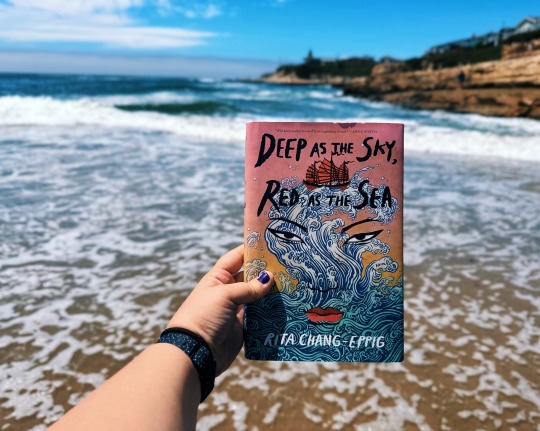
In the seas off a China that is beset by famines and nearing the onset of the opium wars, Shek Yeung is widowed by a fierce battle with the Portuguese. She is left to negotiate rule of their fleet with his second-in-command, and the two must figure out how to keep their fleet thriving and alive both within their alliances across the south China seas and with the European and Chinese ships trying to put an end to the pirates' incursions and robberies. In Deep as the Sky, Red as the Sea, a historical fiction novel, Rita Chang-Eppig digs into the legends and stories of a true pirate queen.
Something about the pacing of the writing made this book go slowly. I still ate it up happily, but it wasn't one you could fall into easily. You had to stick with it, let yourself sink slowly in for a chapter or two, before you could feel truly in its current again. It lingered in some places and skipped across others in ways I didn't always agree with. Even so, I thought the book was fascinating and never considered putting it down. I wanted desperately to know what happened to Shek Yeung, this complicated, complex heroine, able to become independent and brutal, but always needing to fight and plot and consider her next move. The relationships and careful schemes were interesting, and I had to stick around to the end to see what would come of the pirates in a rapidly changing Asia.
Content warnings for sexual assault, violence, ableism, suicidal ideation.
#rita chang-epping#deep as the sky red as the sea#bookworm#historical fiction#bookish love#my book reviews
46 notes
·
View notes
Text
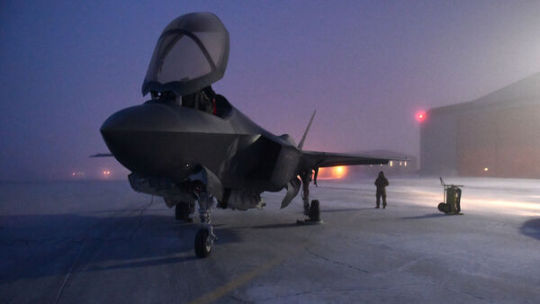
UFO shot down over Canada
The U.S. and Canada are investigating three unidentified flying objects shot down over North America in the past three days. Militaries have adjusted radars to try to spot more incursions.
Pentagon and intelligence officials are trying to make sense of three unidentified flying objects over Alaska, Canada and Michigan that U.S. fighter jets shot down with missiles on Friday, Saturday and Sunday.
The latest turn in the aerial show taking place in the skies above North America comes after a helter-skelter weekend involving what at times seemed like an invasion of unidentified flying objects.
The latest object had first been spotted on Saturday over Montana, initially sparking debate over whether it even existed. On Saturday, military officials detected a radar blip over Montana, which then disappeared, leading them to conclude it was an anomaly. Then a blip appeared Sunday over Montana, then Wisconsin and Michigan. Once military officials obtained visual confirmation, they ordered an F-16 to shoot it down over Lake Huron.
There are two big questions around the episodes: What were the craft? And why does the United States appear to be seeing more suddenly, and shooting down more? There are no answers to the first question yet. American officials do not know what the objects were, much less their purpose or who sent them.
For the second, it is not clear if there are suddenly more objects. But what is certain is that in the wake of the recent incursion by a Chinese spy balloon, the U.S. and Canadian militaries are hypervigilant in flagging some objects that might previously have been allowed to pass.
The object spotted approaching Lake Huron on Sunday was flying at 20,000 feet and presented a potential threat to civil aviation, so President Biden ordered it shot down, U.S. officials said. It had an octagonal structure with strings hanging off but had no discernible payload, they added.
U.S. and Canadian officials say the objects shot down on Friday and Saturday were also flying lower than the spy balloon, posing a greater danger to civilian aircraft, which prompted leaders to order them destroyed. Those two objects were flying over parts of Alaska and the Yukon that have few residents, and the third object downed on Sunday was over water, so risks posed by falling debris were minimal, they said.
U.S. officials said they are reviewing video and other sensor readings collected by the American pilots who observed the objects before their destruction. But the exact nature of the objects, where they are from and what they were intended for will not be confirmed until the F.B.I. and the Royal Canadian Mounted Police have the chance to thoroughly examine the debris, officials said.
Asked during a news conference on Sunday whether he had ruled out extraterrestrial origins, Gen. Glen D. VanHerck, the commander of the Air Force’s Northern Command, said, “I haven’t ruled out anything at this point.”
24 notes
·
View notes
Text
Russian President Vladimir Putin met with Chinese premier Li Qiang Wednesday, hailing growing trade relations as Moscow becomes increasingly dependent on Beijing for political and economic support.
“Our trade relations are developing, developing successfully ... The attention that the governments of the two countries on both sides are paying to trade and economic ties is yielding results,” Putin said at the meeting in the Kremlin.
He also said that Russia and China have developed “large-scale plans” for economic and other projects.
“Chinese-Russian relations are at an unprecedentedly high level," said Li, who earlier had met with his Russian counterpart, Prime Minister Mikhail Mishustin.
The meeting took place as Russia struggled to push back a Ukrainian incursion into the Kursk region now in its third week. And overnight, Moscow experienced one of the largest waves of drone attacks on the Russian capital since the start of the Ukraine conflict.
Russian news reports did not indicate whether Putin and Li discussed Ukraine.
China has tried to position itself as neutral in the Ukraine conflict, but it shares with Russia high animosity toward the West.
After Western countries imposed heavy sanctions on Russian oil in response to Russia sending troops into Ukraine in February 2022, China strongly stepped up its purchase of Russian oil, increasing its influence in Russia. Putin underlined the importance of China by meeting in Beijing with Chinese leader Xi Jinping soon after being inaugurated for a fifth term in the Kremlin.
A U.S. intelligence assessment released this year indicates that China has significantly increased sales to Russia of machine tools, microelectronics and other technology Moscow uses to produce missiles, tanks, aircraft and other weaponry.
AP
4 notes
·
View notes
Text
‘What the f**k to do with them?’ Russian soldiers heard condemning North Korean recruits in intercepted audio
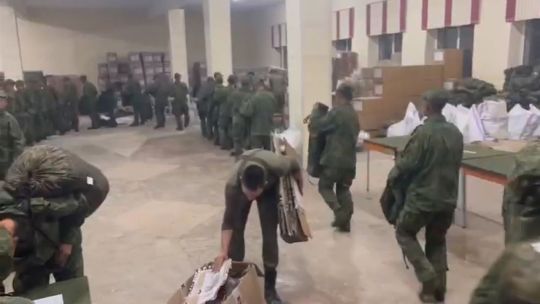
Russian soldiers have been heard raising concerns about how North Korean soldiers will be commanded and provided with ammunition and military kit, leaked intercepts obtained by the Defense Intelligence of Ukraine and released on Friday show.
The Russian soldiers talk disdainfully about the incoming North Korean soldiers, codenamed the “K Battalion,” at one point referring to them as “the f**king Chinese.”
In the same extract, a serviceman describes another who has been tasked to “meet people.”
“And he’s like standing there with his eyes out, like… f**k,” the soldier says. “He came here and says what the f**k to do with them.”
The audio was intercepted from encrypted Russian transmission channels on the night of October 23, according to Ukraine’s Defense Intelligence.
Ukraine’s analysis of the intercepts revealed that North Korean troop movements were planned for the morning of October 24, in the area of Postoyalye Dvory field camp in Russia’s Kursk region, where Ukraine launched a surprise incursion earlier this year.
The intercepts also reveal plans to have one interpreter and three senior officers for every 30 North Korean men, which the Russian soldiers are heard in the audio condemning.
“The only thing I don’t understand is that there [should be] three senior officers for 30 people. Where do we get them? We’ll have to pull them out,” one Russian serviceman says.
“I’m f***ing telling you, there are 77 battalion commanders coming in tomorrow, there are commanders, deputy commanders and so on,” a serviceman says in another extract.
The interepted audio follows a Thursday announcement from Ukraine’s military intelligence service that a group of North Korean soldiers have been spotted in Russia’s Kursk region, an area that borders Ukraine and has seen ongoing military operations.
In a post on its official Telegram account, the Defense Intelligence of Ukraine said some North Korean troops, who had received training in Russia’s far east, have made their way to the western Russian region, where Ukraine has maintained a foothold since launching an incursion in August.
Ukrainian President Volodymyr Zelensky said Friday that he received a report on the deployment of North Korean military personnel from Ukraine’s commander-in-chief.
“According to intelligence, on October 27-28, Russia will deploy its first North Korean troops in combat zones. This is a clear step in Russia’s escalation that matters, unlike all the disinformation circulating in Kazan these days,” Zelensky said, criticizing the BRICS summit staged by Russian President Vladimir Putin this week in the southwestern Russian city of Kazan.
The Kremlin had initially dismissed allegations of North Korean troop deployments, but on Thursday at the BRICS summit, Putin did not deny that Pyongyang had sent soldiers to the country.
North Korea said on Friday that any troop deployment to Russia to aid the war in Ukraine would conform with international law, state media reported, without explicitly confirming such presence. North Korea had previously dismissed such reports.
“The actual involvement of North Korea in combat should be met not with a blind eye and confused comments, but with tangible pressure on both Moscow and Pyongyang to comply with the UN Charter and to punish escalation,” Zelensky added.
#gaza#free gaza#gaza genocide#gaza strip#palestine#gazaunderattack#palestine genocide#lebanon#russia#north korea#putin
3 notes
·
View notes
Text
thoughts on cny/wedding arc, still waters ch. 48-56
I would characterize this arc as primarily about (1) the slow intersection of their worlds, especially Tommy's incursion into Mollie's sphere, and (2) Mollie allowing herself more and more to think of Tommy as not just an employer, not just a friend, but perhaps someone she might even love.
Slow intersection of worlds
Up until this arc, Mollie has mostly existed in Tommy's world, in his house; she's met various members of his family in a personal setting (e.g., the christening), she's been a part of Peaky Blinder machinations whether she intended to or not, but Tommy has not had an equivalent experience yet. This arc provides him with that: visiting the tailor shop to learn more about Mollie's life, the Chinese New Year (CNY) dinner, and finally, culminating into the wedding featuring the full cast of her world.
In Ch. 48, when her mother and Song give her a lecture about not getting close to Tommy, Mollie has a little spasm of rebellion and she tells a fib that she had already invited Tommy to the CNY dinner... on the balance, Mollie is a good person, but one can also argue that she often lies (by omission) and this fib highlights this habit, providing a fascinating parallel to Tommy's selective dishonesty. She knows there is a different Tommy than the one they perceive--and she can't help but want her family to meet and observe him in a more quotidian setting.
I initially dreaded writing Ch. 50, as I had trouble imagining what would transpire between Mollie's parents and Tommy. In the end, I ended up dividing it into a kids' table (Song, Mollie, and Tommy) and a grown-ups' table (Mollie's parents, Jie, and Wan), and building on the notion that Mollie's parents would feel rather uncertain taking the lead with interacting with Tommy.
At first, Mollie's parents are uncomfortable and not sure how to approach.
My mother raised her eyebrows, glancing towards the misshapen plate of apples on the table. "Mr. Shelby is a guest, he can relax," she said.
Thomas shook his head. "It's all right, as your daughter says, my knife handling skills are lacking and I must improve," he said, intent on the apple in his hands.
My mother just gave me a puzzled look and I shrugged, smiling at her. She thought it was best not to engage further.
Even though Mollie's parents have been withdrawn, they have been observing him carefully and looking out for his needs as a guest. Usually, "Tommy Shelby with a knife" inspires panic; however, the scene Mollie's mother witnesses is disturbingly domestic and calm, and perhaps, even a little comical.
Thomas carried the fruit plate out to the dining table, and seemed bemused to have some awkward thanks from my parents. From their quick glances, I knew they also noted his suit jacket had now been taken off and a small pomegranate stain was on his rolled-up white cuff. They cautiously began a trite, stilted conversation about suiting, which turned into another conversation on how to wrangle suppliers.
The first sentence calls back to Ch. 39: "I sat on the armchair opposite him, thinking of what Thomas had been as a child and the circumstances that had been thrust upon him to become an involuntary protector and guardian to his siblings, even to Arthur. An affectionate older brother, to whom no affection had been returned in his later years." Tommy, unused to straightforward expressions of appreciation, is innocently pleased. Next, Mollie's parents finally feel comfortable enough to strike up a conversation, showing how much progress they've made vis-a-vis their perspective on Tommy.
In addition to introducing Tommy to Mollie's family, the CNY dinner also serves as a way for Mollie to introduce Chinese culture to him, another important intersection of their worlds. He proves to be patient and willing to listen, which would not have been the case earlier in the work; hints of this arise in their first interactions where he asks her to do laundry, and when they have the family meeting in Ch. 30. In those chapters, Mollie is still a roughly drawn sketch in his mind, informed more by what he thinks he knows about her, rather than how she directly presents herself.
Ch. 51 is an interlude into Tommy's world again, this time by visiting his mother's grave. Tommy has finally let her into the deepest depths of his pain, and cries in front of her. Mollie calls it his "voluntary surrender"--who or what he surrenders to is up for interpretation; Mollie does not take a stance. I do not have a definitive answer, either.
Ch. 54-56 are the wedding chapters. Mollie and Tommy have been increasingly cocooned away in their private world of softness and warmth, but as Mollie senses, it is an untenable state, and she responds by inviting Tommy into her life, little by little. Tommy is less attuned to this truth due to a variety of reasons. The nice reason: he's a hopeless romantic. The awful reason: he's selfish. He assumes that he could monopolize her time like he does when they're alone together, and that she is, undoubtedly, falling in love with him... but then at the wedding, he's plagued with doubts: she's surrounded by loving friends and family, and of course, there's a new rival who is her perfect match in every single way.
Ossi slots so easily into Mollie's life, getting along with her friends and family instantly. It goes on: he's in the same age group as her, shares the same heritage, is genuinely empathetic and caring, is intelligent, comes from a wealthy family, and is the most handsome man in the entire work (I said what I said). Mollie feels quite comfortable with him as well, immediately bantering with him, and letting him hug her twice when it took Tommy... 51 chapters.
Tommy is tortured by this, and there are small moments where one can observe the vicissitudes of his emotions:
Though his eyes searched my face, his body was motionless, the planes on his face severe. He finally spoke.
"How jealously they keep you."
This is the first time they speak at the wedding, and he is brittle, like glass just about to shatter.
He bent his head, gingerly kissing the tips of my fingers. That soft look through his lashes, irresistible in its surrender, was something that I had only ever seen when we were alone together.
Yet, after Mollie asks him to dance, he softens again.
Those eyes that I thought had been icy were now liquid, ringed by deep, tired lines. There was no tension left in his face, from the corners of his eyes to his jaw, to the soft wave of his hair across his forehead. He was not Thomas Shelby of the Peaky Blinders, he was just Tommy. Tommy, in love, in reverence, in devotion.
When they do finally dance together, the same thing occurs: Tommy is initially miserable but inevitably, he melts. He loves her above all else, and will endure pain to be close to her, even for a few moments. (One of my favorite foreshadowing lines is in Ch. 33: "We repeated this dance over the next few days, teetering on the edge of pain and pleasure.")
Tommy as someone to love
Since Ada revealed Tommy's love for her in Ch. 46, Mollie has been pondering what her feelings towards Tommy are. However, due to her romantic inexperience and her closed-off personality, she finds it hard to verbalize her feelings, even when we are following along in the first-person. Because of this, it is also important to look at the clues in her actions as well as any direct thoughts.
"So, I hear that Cara also requested that you make her a dress for May's wedding?" I said, not wanting to distract Thomas from trying to raise a piece of chicken to his mouth [...]
"I'll be there," he said, putting his chopsticks on the table. I fetched him another piece of chicken, placing it neatly into his bowl [...]
Picking up food and putting it into someone's bowl is a sign of great affection and care in many East Asian cultures. Personally, situations where I would do this would include seeing some relatives after a long time, someone's birthday, someone who has been sick... it's not a gesture that one would do every day in a normal situation.
Additionally, even though she teases his apple peeling skills, she eats it without complaint. This is a play on the East Asian stereotype where East Asians may not vocally admit their love for you, but show it through acts of service such as preparing fruit.
When visiting the grave of Tommy's mother in Ch. 51, Mollie slowly continues to think through her feelings. In the end, she realizes that they have grown so much closer, and her feelings are different than anything she has felt before. What exactly those feelings are, are still to be determined.
Ch. 52 contains probably one of the softest moments in the series so far, in which Mollie falls asleep in an armchair and Tommy kneels in front of the chair, waiting for her to wake up. Like most humans, Mollie finds it hard to look at him when he's being taciturn and severe, but this Tommy, all gentle smiles and let-me-go-get-you-a-coffee, is equally discomfiting, if not more.
The wedding chapters put Mollie through a tumult of emotions; comically, before the ceremony begins, she is paranoid for a few moments that perhaps Tommy was staring (he was not). When they finally talk together, we get the clearest signs of how Mollie's feelings towards Tommy have changed:
That soft look through his lashes, irresistible in its surrender, was something that I had only ever seen when we were alone together. The sounds of the wedding died away, and I felt myself transported to that place of quiet. The warmth spread through my hand, through my arm, through my body.
She references the surrender, but finally places it in context of their relationship.
In Ch. 55, Mollie ponders what it would be like to fall in love with Ossi:
I wondered what it would be like to be loved by, to fall in love with, someone like him... someone so free from the weight of his own existence, someone that wouldn't invite whispers behind my back, someone who accepted me from the beginning without question.
She doesn't fully internalize that her default point of comparison is falling in love with Tommy. It is unclear (to her, to us readers) at what stage Mollie is in with respect to Tommy: is she falling in love with him? Does she love him?
The final chapter of the arc naturally has many notable moments; I will highlight this one:
"Thomas…" I said, unsure of what I should say in return.
"This distance, even in a name," he said. My stomach churned to hear the deep note of sadness in his voice. I had slipped.
To me, this exchange is the most gut-wrenching of the entire work so far, an exchange that has been planned since the beginning. Very early on, Tommy insists that she call him "Tommy"--she does--but in her mind, she calls him Thomas in order to preserve mental distance between them. Tommy has always instinctively felt this distance; he has tried to bridge the gap--but the wedding eventually forces him to expose all of his frustrations ("What more can I do?").
The kiss scene
This scene has been on my mind since the very beginning. I started writing this story in February 2020, so very long ago, and a rough draft of their kiss scene has existed at least since end of 2021, nearly two years ago. Since then, it's undergone five major revisions and countless edits.
In the earliest version, Mollie was actually Tommy's date to the wedding, and the wedding would sort of be a public debut (but they wouldn't officially be a couple). The kiss scene would happen later at Tommy's house, when they were both winding down for bed. But, as I drew closer to the wedding arc, I thought this didn't make sense.
I also waffled back and forth about who would initiate the kiss: Tommy, Mollie, or would they mutually do so? In the first few drafts, I had Tommy initiate, but again, as I continued to write the rest of the story, I became conflicted. Mollie has been slowly taking agency over her life, and Tommy... well, I don't want to say too much right now for fear of spoiling, but here are a few important phrases that might give some clues:
He was not wearing the tuxedo bowtie any longer; the loose, unbuttoned shirt collar exposing pale skin underneath.
I knew that he was waiting for me, now.
"Could you ever love someone like me?" he asked quietly. I looked up to find his blue ones looking intensely into mine, lidded with desire, with hope, and maybe a little fear.
I also thought a lot about whether they would share a short kiss or whether there would be a more passionate exchange (various states of undress, makeout session, etc; strictly PG13, no sex), but again, it seemed too fantastical for the both of them to do such things at that point. Even so, it was important to show their physical chemistry, which is why I added the followup where Mollie bites his lower lip. It's a small gesture, but... in the words of Tommy, "everything about [Mollie] is torture."
For fun, here are all the almost kisses:
Ch. 23
"Step into the light, Mollie," he said. I did as he asked, stepping closer to him. He reached his hand towards my chin, angling it upwards. I could feel his breath on my face, his eyes searching mine intently.
Ch. 31
"You don't understand the nature of my business and my standing, and what I must say even if I…" he trailed off. He moved closer, our noses touching for a brief moment, his eyes half-hooded. I could feel the heat from his body rising towards me. I almost inhaled.
Ch. 48
He slowly inhaled, his lidded eyes softly focused on mine. I could feel the fabric flexing underneath my fingers, the wool of the outer jacket, the fine twill of his shirt, punctuated by smooth buttons.
"I've always loved…" The pressure on my hand increased even more, and I instinctively grasped at the fabric, feeling a sharp intake of breath rush through his chest. "... the feel of Shropshire wool."
Ch. 51
"It's nothing," I mumbled, afraid that he would coax the answer out, afraid that he would recognize how pliant I was in his warm hands. He leaned towards me, as if confirming my fears. There was that question again, and I was not ready to answer it. I leaned into his chest, a collapse of my own.
Ch. 55
"Thank you," he murmured. Thomas brought his hands just beneath my jaw, and slowly leaned in to kiss me lightly on the forehead. He inhaled deeply, his eyelashes trembling at the effort, his fingertips still keeping my face tilted towards him. Would he…?
The dress
Song revised the dress by adding the golden chains to silently protest against Tommy and how she perceives he holds Mollie back. The chains are a physical manifestation of shackles or a cage, but one could also argue they protect her as well and serve as a present reminder of the support of her friends and family...
His arms wrapped around me, his fingertips pressing against the gold chains and digging into my back. I had to break this porcelain fantasy, this brittle gilded cage.
19 notes
·
View notes
Note
re: China Taiwan
the 2022 ADIZ incursions were mostly linked to Pelosi’s announcement of a visit, which was a major change in the previous structure of the US-China relationship
Lai made explicit reference to Taiwanese independence during the October 10 speech. Not an US provocation no that’s fair enough - personally I think the shift from Bush-era Responsible Stakeholder policy and the frankly terribly conciliatory Obama G2 vision to a confrontational stance after Trump’s phone call with Tsai has encouraged such reckless discourse but it definitely was a Taiwanese decision
I’m not sure what “investigation into anxiety over having children” you’re referring to? But given that they had policy changes to address anxiety over homework (double reduction in 2020) I don’t think that’s necessarily the strongest piece of evidence. Qiushi isn’t just some public statement either, it’s where the Party elevates critical and endorsed political stances. Add to that that it was specifically a Xi speech and it seems like the Party cadre are not expected to treat this as more serious than any welfare policy. If you want to deem rhetoric as lies, doesn’t it make more sense to discard the press conference statements and elevate internal documents?
The firing of Dong, Qin, Miao, and others is probably one of those things you can read either way based on your perspective but it doesn’t ring true to me that they’re preparing for aggressive action in the next four years. If China was preparing for war why would they also be encouraging tourism from Taiwan to the mainland (I.e. a vector for espionage and sabotage).
You didn’t really address this but again - when has Xi done anything to indicate he’s elevated Taiwan to a top priority or tied his legacy to it? Mostly he’s just repeated previous doctrine while elevating internal anti-corruption to the top priority
I don’t think it’s fair to call me dishonest or accuse me of peddling revisionist nonsense. I like your work or I wouldn’t be engaging with it. I just don’t think the facts on the ground match your perspective. An imminent war is unlikely
I think it's fair to say that calling Chinese aggression against Taiwan as "pretty much" reactions to American action is dishonest and revisionist statements meant to absolve China of its aggression; I don't believe I'm out of line for saying it. Joint Sword 2024A was launched due to Lal's inauguration speech, just as Joint Sword 2024B was against the National Day speech. These drills were enacted as a show of force against Taiwan, not due to American action, so to claim as such is, I believe, actively dishonest rather than a difference in interpretation. There's no real way to square the idea that Chinese drills were done in response to the United States when so many actions don't have a clear parallel.
I also object to the characterization of Taiwanese dialogue as "reckless," while downplaying Chinese rhetoric as routine, especially when compounded with aggressive action. Somehow, only Taiwanese positions are considered aggressive. Consistent talk about reunifying the island, stating the use of force as possible, along with increasing military escalation and economic sanctions leads me to say that China does consider Taiwan a priority as part of Xi's overall shift toward more aggressive foreign policy - against Hong Kong, against the Philippines, against Southeast Asia by poaching water resources, etc. Hence why I said dishonest - there were too many actions that seemed to focus on distorting the facts to present China as the wrongly aggrieved party, pushed around by a dangerous United States. It's the same rhetoric Russia has been using in Ukraine, and I don't buy it there either.
I also object to the notion that rhetoric was relatively consistent over the Jiang Zemin and Hu Jintao eras - there were wild swings in Cross-Strait relations up and down, from the Third Taiwan Straits Crisis (frequently blamed on Lee Teng-hui's visit to the US but I'm skeptical - the timing suggests it was an intimidation move against the 1996 ROC elections) with periods of contact and no contact depending on the party in charge.
The ADIZ incursions, no, sorry, I'm not buying it. This was a sustained campaign that lasted well past Pelosi's visit for years. Moreover, they had been going on since 2020, well before Pelosi's visit. Again, this is simply not factual.
I'm referring to the efforts taken to reverse demographic decline - it's relatively well-known. There is significant concern about population decline and aging in China and China has attempted to address it with pro-natalism policies which did not work, leading to the study I mentioned earlier. It's not unique to China certainly (other nations are facing similar concerns), but unlike other nations, China's restrictive immigration policy means one big policy tool to address it doesn't work quite well.
I don't think the fostering of tourism or trade ties means a disqualification of military force. In the Second World War, Japan increased trade and tourism to the United States before attacking Pearl Harbor.
I'd actually strongly disagree that anti-corruption is Xi's primary focus. His anti-corruption force is largely a tool meant to purge political opposition and assert supremacy within the party. I'd argue his chief focus was primarily establishing himself as a personalist dictator in the vein of Mao, evidenced by said purges and the removal of term limits.
I maintain that the threat of a military conflict over Taiwan is a very real possibility. The aggressive posture that has increasingly characterized Chinese foreign policy leads me to believe it.
-SLAL
8 notes
·
View notes